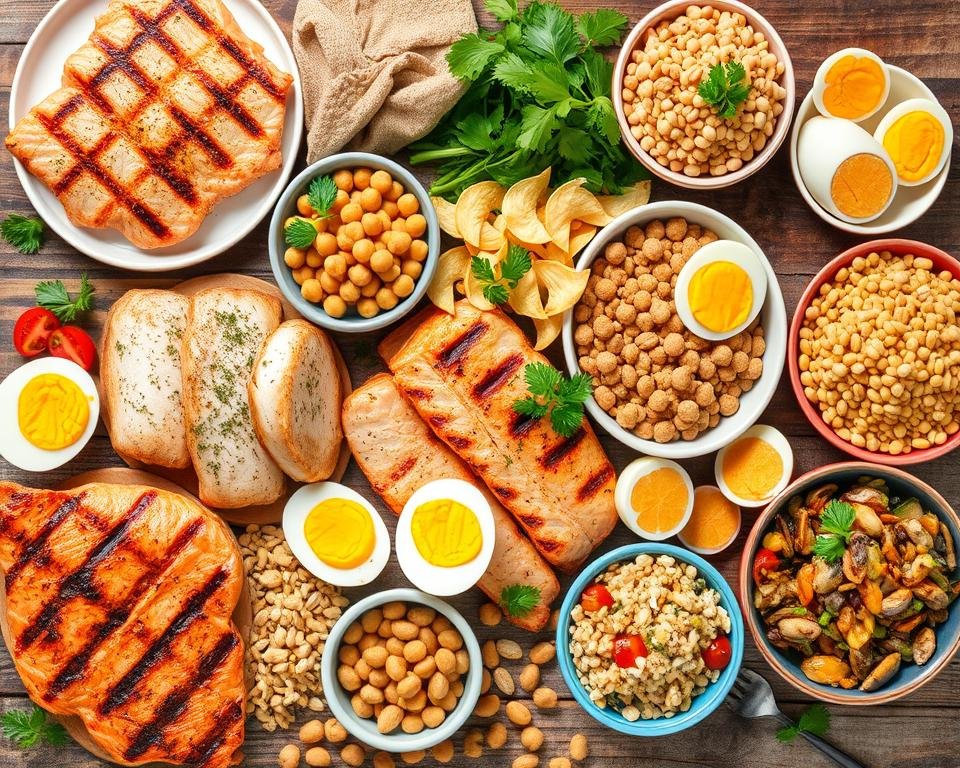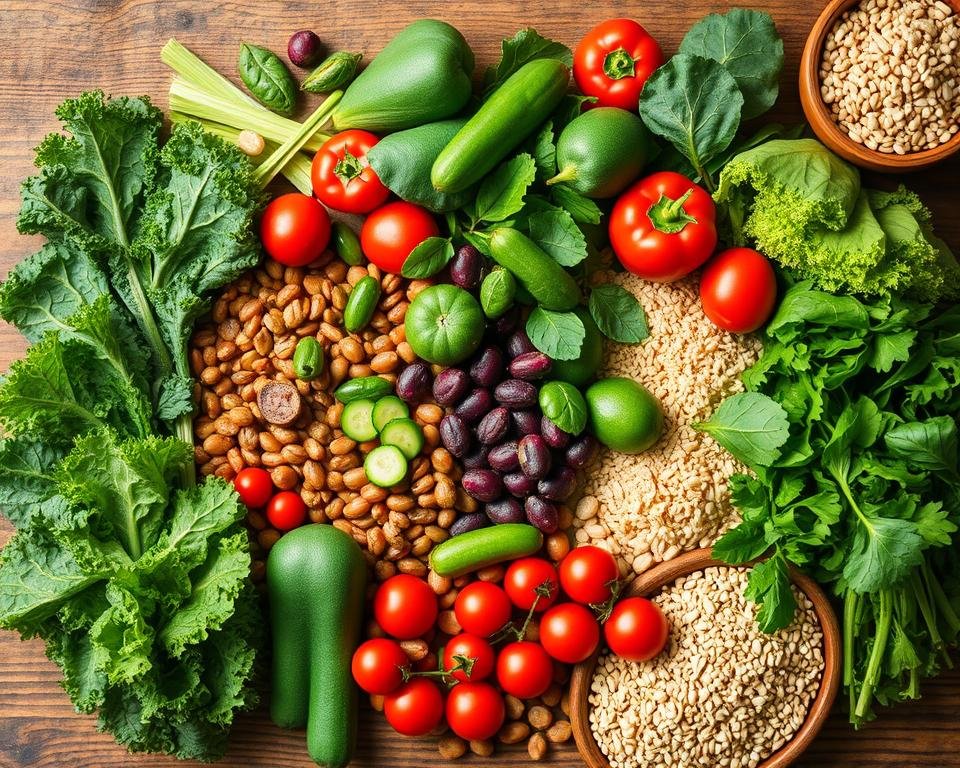Losing weight doesn’t have to be hard. You can focus on simple lifestyle changes instead of counting calories. This guide offers 10 easy tips to help you lose weight without tracking calories. These include eating eggs for breakfast, using smaller plates, and eating more protein.
It’s also about eating foods that are low in carbs and high in fiber. Plus, getting enough sleep and managing stress are key. These tips help you lose weight naturally, without the need to count every calorie.
The goal is to move away from strict calorie counting. Instead, focus on building healthy habits. By making small changes to your diet and lifestyle, you can reach your weight loss goals. Remember, it’s about progress, not perfection.
Let’s explore these 10 simple tips to help you lose weight without counting calories.
Replace Your Grain-Based Breakfast With Eggs
Looking to lose weight without counting calories? Try switching to an egg-based breakfast. Studies show that eggs can help you eat fewer calories all day. This makes them a great choice for reducing calorie intake and reaching your weight loss goals.
Eggs Provide a More Satisfying Breakfast
Eggs are very satiating. They make you feel full longer than bagels or cereal. Eating eggs for breakfast can cut your calorie intake by up to 135 calories later in the day.
Increasing your protein to 30% of your daily calories can lead to eating 441 fewer calories. This can result in significant weight loss over time.
“Eating a high-protein breakfast can reduce hunger and help people consume up to 135 fewer calories later in the day.”
An egg-based breakfast can also help you lose more weight. It can lead to a lower BMI and smaller waist measurements. This is because eggs are packed with high-quality protein and other nutrients that keep you full and support your health.

To enjoy the benefits of an egg-based breakfast, aim for a meal with at least 25 grams of protein. Try scrambled eggs, omelets with veggies, or a breakfast sandwich with egg, cheese, and lean meat. This simple change can help you start your day right, supporting your weight loss without needing to count calories.
Using Smaller Plates Can Trick Your Brain Into Thinking That You’re Actually Eating More
The size of your plate can affect how much you think you’re eating. Our brain uses visual cues from the plate to judge food intake. Using smaller plates can make you feel like you’re eating more, even if you’re not. This can lead to feeling full with fewer calories.
This trick can help with weight loss without needing to count calories. By eating on smaller plates, your brain sees the food as more. This makes it easier to control portions without feeling like you’re missing out.

A study in the Journal of the American Dietetic Association showed a big difference. People eating from smaller plates ate up to 30% fewer calories than those with larger plates. This shows how tricking the brain with visual cues can lead to better eating and weight management.
Using smaller plates daily can be a simple way to lose weight. It doesn’t require counting calories or strict diets. This small change can greatly improve how satisfied you feel after eating.
Eating More Protein Can Reduce Appetite, Increase Fat Burning and Help You Gain Muscle
Adding more protein to your diet can help you lose weight without counting calories. Protein boosts your metabolism, makes you feel full, and helps build muscle. Eating foods high in protein, like meat, fish, eggs, and legumes, can make you eat less naturally.
Many studies show that a high-protein diet is good for losing weight and improving body shape. Eating too much protein can burn up to 260 more calories a day. Also, getting 30% of your calories from protein can cut down your daily calorie intake by 441 calories on average.
More protein also helps with fat burning and muscle gain. Protein takes more energy to digest and use than carbs and fats. This can raise your resting metabolic rate, helping you burn more calories.
“Protein may help prevent weight regain after initial weight loss, and it is also associated with less belly fat accumulation.”
Eating a variety of protein-rich foods, both animal and plant-based, is key for lasting weight control and better body shape. By changing your diet a bit, you can enjoy the benefits of a high-protein diet without counting calories all the time.

Eating Foods With a Low Calorie Density and Lots of Fiber Makes You Feel Fuller With Fewer Calories
Weight loss often means counting every calorie. But, there’s a simpler way to feel full on fewer calories. Eat foods with a low calorie density. These foods are full of volume and nutrients but have few calories.
Foods high in water and fiber, like vegetables, some fruits, and whole grains, are great examples. Studies show people who eat these low-calorie density foods lose more weight. They do this without strict calorie counting.
“Participants in a study lost an average of 17 pounds after switching their high-calorie-density fats to low-calorie-density fruits and vegetables for one year.”
High-fiber, low-calorie foods make you feel full with fewer calories. They take up more space in your stomach. This tells your brain to stop eating sooner. In contrast, calorie-dense foods like chips and sugary drinks can lead to overeating and weight gain.

To lose weight without counting calories, eat more low-calorie density and high-fiber foods. This simple change can help you feel full with fewer calories. It makes losing weight a more enjoyable and sustainable journey.
Cutting Carbs Can Make You Lose Weight Fast While Eating Until Full
One of the best ways to lose weight is to eat fewer carbs. Studies show that cutting carbs leads to eating less and losing weight, even when you’re full. The FDA suggests eating 275 grams of carbs a day if you’re on a 2,000-calorie diet.
By cutting out carbs like sugars and starchy foods, you’ll eat less and lose weight. You’ll also lose water weight, helping you lose pounds without counting calories.
“Low carb diets have shown to reduce appetite, allowing individuals to consume fewer calories and potentially leading to easier weight loss compared to other diet approaches.”
Research shows low carb diets lead to more weight loss than low fat diets over a year. They can even cut visceral fat by up to 22.8% in the belly.
People on low carb diets lose about 13 pounds a year, studies say. These diets have 20 to 120 grams of carbs daily, depending on your age and activity level.
Healthy carbs include lean meats, fish, eggs, veggies, nuts, and avocados. Focus on fiber-rich foods for better health. The right carb intake varies based on your age, sex, and activity level.
Healthy Habits to Implement to Lose Weight Without Tracking Calories
It’s possible to lose weight without counting calories by adopting simple habits. Start by eating more whole, unprocessed foods. Choose fresh fruits, veggies, lean proteins, and whole grains over processed snacks and sweets.
Drinking water is also key. It helps you lose weight and feel full. Aim for 1 to 1.5 liters of water a day to see results.
Mindful eating is another game-changer. Eat without distractions and listen to your body’s hunger and fullness signals. This helps control how much you eat and makes meals more enjoyable.
Don’t forget the importance of sleep and managing stress. Poor sleep and stress can make you hungry and crave unhealthy foods. Try to sleep 8.5 hours a night and find ways to relax.
By making these lifestyle changes, you can manage your weight in a healthy way. You won’t need to constantly count calories.
Making Time for Quality Sleep and Avoiding Stress Can Optimize the Function of Key Hormones
Getting quality sleep and managing stress are key for losing weight. Not getting enough sleep and feeling stressed can mess with hormones. Hormones like ghrelin, leptin, and cortisol help control hunger and metabolism.
Optimize Hormonal Balance for Better Appetite Regulation and Weight Loss
Good sleep habits and stress management can improve hormone function. This leads to less hunger, better appetite regulation, and easier weight loss.
Research shows sleep loss raises ghrelin, the “hunger hormone,” and lowers leptin, the “satiety hormone.” This imbalance can cause unnatural cravings and hard appetite control. But, enough quality sleep balances these hormones, aiding in healthy weight management.
“Sleep disturbance can predict weight loss success. Sleep deprivation is associated with more fat deposits, particularily around the torso.”
Also, adequate sleep and stress management boost health, energy, and physical performance. These benefits help in a lasting weight loss journey.
Portion control
Portion control is a vital strategy for maintaining a healthy diet and lifestyle. Practicing portion control allows individuals to enjoy a wide variety of foods without overindulging, which can lead to weight gain and other health issues. By being mindful of portion sizes, one can develop a healthier relationship with food, ensuring that meals are not only satisfying but also nutritionally balanced. This awareness can foster the ability to savor each bite, transforming eating into a more enjoyable and mindful experience.
Moreover, portion control can significantly reduce stress related to food choices and weight management. When individuals understand how much food their bodies truly need, they are less likely to experience guilt or anxiety about overeating. Planning meals with appropriate portion sizes can simplify grocery shopping and meal preparation, decreasing the time and energy spent on food decisions. As a result, it allows for a more relaxed approach to eating, where the focus shifts to the enjoyment of wholesome, nutritious foods.
In addition to portion control, it is essential to make conscious choices about the types of foods consumed. One effective way to enhance a health-conscious diet is to avoid processed foods, which are often high in unhealthy fats, sugars, and sodium. These foods tend to contribute to larger portion sizes and an overall imbalance in dietary nutrition. Instead, opting for whole, minimally processed foods such as fruits, vegetables, lean proteins, and whole grains aligns perfectly with the principles of portion control, enabling individuals to nourish their bodies effectively without excess calories.
Ultimately, by integrating portion control into daily routines and steering clear of processed options, individuals can achieve a healthier lifestyle that promotes well-being and vitality. This approach not only aids in maintaining a healthy weight but also cultivates a positive mindset towards food. Embracing these practices can lead to lasting changes, creating a sustainable path towards a balanced, nutritious diet that supports long-term health and happiness.
Stay Hydrated
Stay hydrated is a fundamental yet often overlooked aspect of maintaining overall health and well-being. Water plays a crucial role in almost every bodily function, from regulating body temperature to aiding in digestion and nutrient absorption. Many people underestimate their daily water needs, particularly active individuals or those living in warmer climates. By making a conscious effort to drink enough fluids throughout the day, you can enhance your energy levels, support your immune system, and help your body function more efficiently.
In addition to staying hydrated, it’s important to remember the synergy of hydration with other healthy habits, such as getting enough sleep. Sleep allows your body to recover and rejuvenate, but dehydration can impact the quality of your rest. When you’re well-hydrated, your body can function better during sleep cycles, improving overall restfulness and recovery. The more balanced your lifestyle is, the more effectively your body can manage stress, repair itself, and maintain energy levels.
Moreover, increasing your protein intake while staying properly hydrated can also optimize your body’s performance. Protein is essential for muscle repair, growth, and overall energy levels. Pairing adequate protein intake with sufficient hydration aids in nutrient transport and utilization. This is especially important for those engaging in regular physical activity, as both hydration and protein are pivotal in achieving fitness goals and enhancing recovery times.
Finding simple ways to remind yourself to drink water throughout the day—such as carrying a reusable water bottle or setting reminders on your phone—can significantly contribute to your hydration efforts. When you commit to staying hydrated and adopting complementary practices like getting enough sleep and increasing your protein intake, you are laying the foundation for a healthier lifestyle that will benefit you both physically and mentally. With small yet consistent changes, you can cultivate habits that enhance your vitality and promote optimal health.
Incorporate Exercise
In our fast-paced lives, it’s easy to let our health take a backseat. One of the most effective ways to prioritize well-being is to incorporate exercise into our daily routines. Exercise doesn’t only contribute to physical health; it also benefits mental wellness, enhancing mood and reducing stress. Even small changes, such as taking the stairs instead of the elevator or going for a brisk walk during lunch, can significantly boost your fitness levels over time. Prioritizing movement encourages a mindset shift that helps us appreciate our bodies’ capabilities, leading to a more active and fulfilling lifestyle.
To maximize the benefits of exercise, it’s crucial to remember that recovery plays an essential role. One key aspect of recovery is ensuring you get enough sleep. Quality sleep allows your body to repair itself, balancing hormones and supporting muscle recovery. When combined with regular physical activity, good sleep can enhance your overall health, making it easier to maintain motivation and performance during workouts. Establishing a consistent sleep schedule can create a harmonious balance that supports your exercise routine and general well-being.
In addition to exercise and sleep, optimizing your nutrition is vital for achieving fitness goals. Increasing your protein intake can significantly impact muscle repair and growth. Protein is the building block of muscle tissue, and consuming adequate amounts post-workout can help your body recover more efficiently. Incorporating sources of lean protein, such as chicken, beans, or tofu into your meals, along with regular exercise, sets the stage for better overall health, increased energy levels, and improved performance in your physical activities.
Ultimately, creating a lifestyle that prioritizes exercise, adequate sleep, and proper nutrition can lead to profound changes in how we feel and function. By carving out time for movement, nurturing our bodies with restorative sleep, and focusing on a well-rounded diet rich in protein, we can build a resilient foundation for longevity and vitality. Rather than viewing these elements as separate tasks, integrating them into a cohesive routine can elevate your health and enrich your life in countless ways.
Conclusion
Losing weight doesn’t have to be all about counting calories. Simple, healthy habits can help you reach your goals. Try replacing grain-based breakfasts with eggs, using smaller plates, and eating more protein.
Choose foods that are low in calories but high in fiber. Cutting down on carbs and getting enough sleep and managing stress also helps. These steps can lead to a calorie deficit without the stress of counting every calorie.
Studies reveal that many find calorie tracking too hard to keep up. But, eating whole, nutrient-rich foods can cut daily calorie intake by 500-700 calories. Mindful eating can also lower meal calories by 12%.
Drinking enough water and staying active also aid in weight loss. They help reduce calorie intake and burn more calories. By adopting these weight loss without calorie counting, healthy habits, and sustainable weight management strategies, you can achieve a healthier lifestyle. Start using these simple, effective methods to reach your weight loss goals.



Pingback: 4000 Calorie Breakfast Only - Ultimate Morning Feast
Pingback: Eating 6000 Calories a Day: Health Impact & Effects
Pingback: What Breed Is My Cat - Identify Your Feline Friend
Pingback: Is Soy Sauce OK for Liver Reduction Diet?